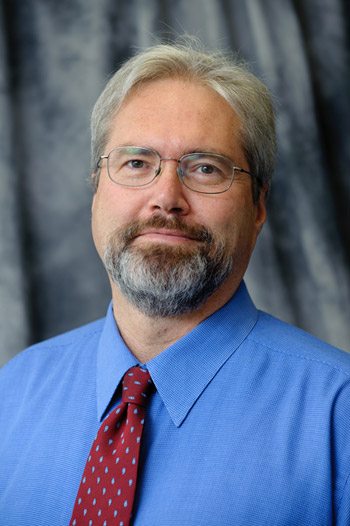
David Williams, one of the world’s leading experts on human vision, has been named a member of the National Academy of Sciences in recognition of his distinguished and continuing achievements in original research. The honor is one of the highest given to a scientist in the United States. Williams was one of 84 scientists selected for 2014.
Williams has pioneered new technologies that are improving the eyesight of people around the globe, from the legally blind to those with 20/20 vision. He is the University of Rochester’s William G. Allyn Professor of Medical Optics, dean for research and director of the Center for Visual Science.
“David’s election to the National Academy recognizes a remarkable record of truly brilliant contributions to our understanding of how we see,” said Peter Lennie, provost and Robert L. and Mary L. Sproull Dean of the Faculty of Arts, Science, and Engineering. “His work ranges from fundamental discoveries about the organization of the photoreceptors in the eye, to the development of inventive techniques that greatly improve the outcomes from refractive surgery and greatly improve our prospects for understanding retinal disease.”
“David Williams has been a force in the field of vision science, and his induction into the National Academy of Sciences is very well deserved,” said Robert L. Clark, senior vice president for research and dean of the Hajim School of Engineering and Applied Sciences. “His work and his mentorship of students and colleagues exemplify the high academic values that we strive for here at the University of Rochester.”
In 2012 he received the most prestigious award in the field of vision, the António Champalimaud Vision Award. In awarding the prize, the jury said Williams and his research group have “revitalized the field of physiological optics, producing year after year truly beautiful, technically brilliant, and groundbreaking work.” He was honored for his work on adaptive optics technologies—a “major breakthrough in the understanding and/or the preservation of vision.”
Astronomers first developed adaptive optics so that telescopes could see more clearly through the Earth’s atmosphere. The technologies that Williams and his group developed allow them to apply these techniques to the eye and make it possible to image individual retinal cells, down to individual cone photoreceptors in the living human retina. This can be done by sending light directly through the pupil and analyzing the light that reflects back out of the pupil. These techniques can not only modify the light leaving the eye to obtain better pictures of the retina, but they can also modify the light going into the eye to obtain better vision. This can improve vision in patients with contact lenses, intraocular lenses, and laser refractive surgery. For example, the methods Williams’s group developed have improved the outcomes of all Lasik procedures worldwide.
Williams is the author of more than 100 papers, a Fellow of the American Association for the Advancement of Science, and recipient of the Friedenwald Award from the Association for Research in Vision and Ophthalmology, among other honors. In 2003, his adaptive optics phoropter, which allows for more precise corrective lens prescriptions, was named one of R&D Magazine’s top 100 inventions of the year. He joined the University in 1981 after earning a doctorate in psychology in 1979 from the University of California at San Diego.
The National Academy of Sciences is a private, nonprofit institution that was established under a congressional charter signed by President Abraham Lincoln in 1863. It recognizes achievement in science by election to membership, and – with the National Academy of Engineering, Institute of Medicine, and National Research Council – provides science, technology, and health policy advice to the federal government and other organizations.

